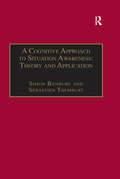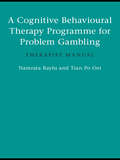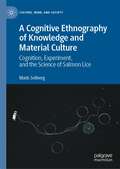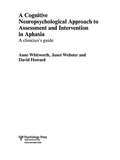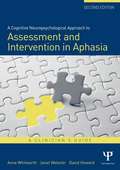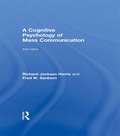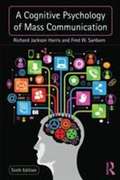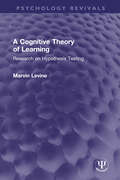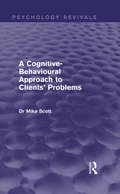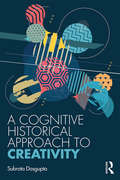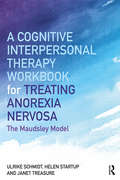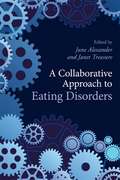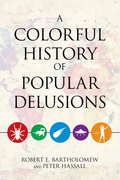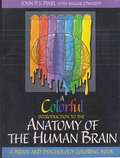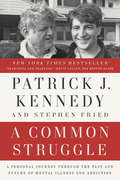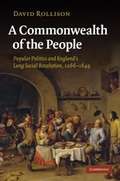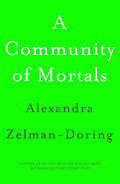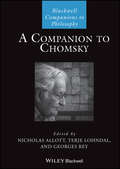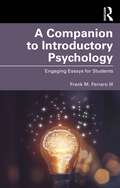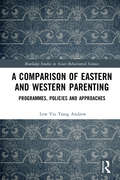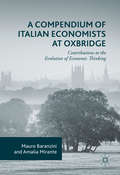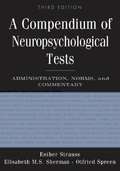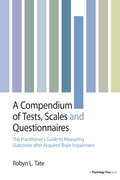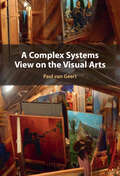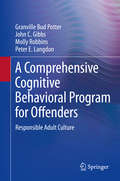- Table View
- List View
A Cognitive Approach to Situation Awareness: Theory and Application
by Sébastien TremblayThe importance of 'situation awareness' (SA) in assessing and predicting operator competence in complex environments has become increasingly apparent in recent years. It has been widely established that SA is a contributing factor to many commercial and military accidents and incidents. Yet determining exactly what constitutes SA is a very difficult task, given the complexity of the construct itself, and the many different processes involved with its acquisition and maintenance. This volume brings together recent developments from researchers and practitioners from around the world who are studying and applying SA from a cognitive perspective. The 41 contributors represent many different theoretical perspectives, research approaches and domains of application. Each chapter has a primary emphasis around one of three main topics - theory, measurement and application and examines the considerable inter-linkage between them. To bring further coherence to the book, all of the contributors received draft manuscripts of those chapters most relevant to their own. Designed to be completely international and interdisciplinary, the authors themselves present varied perspectives from academic departments and industrial organisations from around the world, and from broad applications - with contributions from researchers in the domains of process control, sport, aviation, transportation, and command and control. The readership includes practitioners, academics and researchers within human factors, ergonomics and industrial psychology; Graduate and Undergraduate students specialising within these areas during their final year.
A Cognitive Behavioural Therapy Programme for Problem Gambling: Therapist Manual
by Namrata Raylu Tian Po OeiThis book is a treatment manual providing guidance for therapists treating clients with gambling addictions. In this book the authors use a cognitive behavioural approach and provide a session by session guide for overcoming problem gambling. Essential topics covered include: assessment and psychoeducation cognitive behavioural strategies to stabilize gambling identifying and challenging thinking errors relaxation and imaginal exposure problem solving and goal setting managing negative emotions relapse prevention: maintaining a balanced lifestyle and coping with high risk situations A Cognitive Behavioural Therapy Programme for Problem Gambling supplies detailed information to help the therapist and client understand gambling behaviours, as well as practical advice on techniques that can be used with the client to change these behaviours. This practical guide includes handouts and exercises that can be downloaded by purchasers of the print edition. It will provide helpful guidance for addiction counsellors and therapists worldwide.
A Cognitive Ethnography of Knowledge and Material Culture: Cognition, Experiment, and the Science of Salmon Lice (Culture, Mind, and Society)
by Mads SolbergThis cognitive ethnography examines how scientists create meaning about biological phenomena through experimental practices in the laboratory, offering a frontline perspective on how new insights come to life. An exercise in the anthropology of knowledge, this story follows a community of biologists in Western Norway in their quest to build a novel experimental system for research on Lepeoptheirus salmonis, a parasite that has become a major pest in salmon aquaculture. The book offers a window on the making of this material culture of science, and how biological phenomena and their representations are skillfully transformed and made meaningful within a rich cognitive ecology. Conventional accounts of experiments see their purpose as mainly auxiliary, as handmaidens to theory. By looking closely at experimental activities and their materiality, this book shows how experimentation contributes to knowledge production through a broader set of epistemic actions.In drawing on a combination of approaches from anthropology and cognitive science, it offers a unique contribution to the fields of cultural psychology, psychological anthropology, science and technology studies and the philosophy of science.
A Cognitive Neuropsychological Approach to Assessment and Intervention in Aphasia: A Clinician's Guide
by David Howard Anne Whitworth Janet WebsterThis book provides both a theoretical and practical reference to cognitive neuropsychological approaches to speech and language therapists working with people with aphasia. Having evolved from the activity of a group of clinicians working with people with aphasia, it is a highly practical guide that aims to interpret the theoretical literature as it relates to aphasia and link it directly to available assessment tools and therapy techniques. The opening section of the book provides an overview of the theory underpinning the approach and how it can be applied to the assessment and interpretation of language-processing impairments. The second section offers a working explanation of different components of language processing, outlining the deficits that may arise from impairment to each component. In addition, the clinician is guided to available assessments to test out clinical hypotheses and offered interpretations of performance patterns. The final section provides a comprehensive overview of the therapy literature with systematic summaries of the therapies undertaken and a synthesis of the findings to date. This book has been written by clinicians with hands-on experience. It will be an invaluable resource for clinicians and students of speech and language therapy and related disciplines.
A Cognitive Neuropsychological Approach to Assessment and Intervention in Aphasia: A clinician's guide
by David Howard Anne Whitworth Janet WebsterThis is a second edition of the highly popular volume used by clinicians and students in the assessment and intervention of aphasia. It provides both a theoretical and practical reference to cognitive neuropsychological approaches for speech-language pathologists and therapists working with people with aphasia. Having evolved from the activity of a group of clinicians working with aphasia, it interprets the theoretical literature as it relates to aphasia, identifying available assessments and published intervention studies, and draws together a complex literature for the practicing clinician. The opening section of the book outlines the cognitive neuropsychological approach, and explains how it can be applied to assessment and interpretation of language processing impairments. Part 2 describes the deficits which can arise from impairments at different stages of language processing, and also provides an accessible guide to the use of assessment tools in identifying underlying impairments. The final part of the book provides systematic summaries of therapies reported in the literature, followed by a comprehensive synopsis of the current themes and issues confronting clinicians when drawing on cognitive neuropsychological theory in planning and evaluating intervention. This new edition has been updated and expanded to include the assessment and treatment of verbs as well as nouns, presenting recently published assessments and intervention studies. It also includes a principled discussion on how to conduct robust evaluations of intervention within the clinical and research settings. The book has been written by clinicians with hands-on experience. Like its predecessor, it will remain an invaluable resource for clinicians and students of speech-language pathology and related disciplines, in working with people with aphasia.
A Cognitive Psychology of Mass Communication
by Richard Jackson Harris Fred W. SanbornA Cognitive Psychology of Mass Communication is the go-to text for any course that adopts a cognitive and psychological approach to the study of mass communication. In its sixth edition, it continues its examination of how our experiences with media affect the way we acquire knowledge about the world, and how this knowledge influences our attitudes and behavior. Using theories from psychology and communication along with reviews of the most up-to-date research, this text covers a diversity of media and media issues ranging from commonly discussed topics, such as politics, sex, and violence, to lesser-studied topics, such as sports, music, emotion, and prosocial media. This sixth edition offers chapter outlines and recommended readings lists to further assist readability and accessibility of concepts, and a new companion website that includes recommended readings, even more real-world examples and activities, PowerPoint presentations, sample syllabi, and an instructor guide.
A Cognitive Psychology of Mass Communication (Sixth Edition)
by Richard Jackson Harris Fred W. SanbornA Cognitive Psychology of Mass Communicationis the go-to text for any course that adopts a cognitive and psychological approach to the study of mass communication. In its sixth edition, it continues its examination of how our experiences with media affect the way we acquire knowledge about the world, and how this knowledge influences our attitudes and behavior. Using theories from psychology and communication along with reviews of the most up-to-date research, this text covers a diversity of media and media issues ranging from commonly discussed topics, such as politics, sex, and violence, to lesser-studied topics, such as sports, music, emotion, and prosocial media. This sixth edition offers chapter outlines and recommended readings lists to further assist readability and accessibility of concepts, and a new companion website that includes recommended readings, even more real-world examples and activities, PowerPoint presentations, sample syllabi, and an instructor guide.
A Cognitive Theory of Learning: Research on Hypothesis Testing (Psychology Revivals)
by Marvin LevineFirst published in 1975, A Cognitive Theory of Learning provides a history of hypothesis theory (H theory), along with the author’s research from the previous decade. The first part introduces the reader to contributions of some major learning theorists. It traces the history of H theory, reviewing the confrontation with conditioning theory, with the stress on the emergence of H theory which came to predominate. The second part describes the author’s work, presented as it emerged over time. It shows how the outcome of one experiment typically led to the next theoretical development or experiment. Originally part of The Experimental Psychology Series this reissue can now be read and enjoyed again in its historical context.
A Cognitive-Behavioural Approach to Clients' Problems (Psychology Revivals)
by Michael J. ScottThe most useful therapy is one that can be applied to a wide range of client problems, is easy to learn, and produces lasting results following a brief intervention. The cognitive-behavioural approaches described in this volume probably come nearest to this ideal. Originally published in 1989, this book begins with a description of the cognitive-behavioural revolution that had taken place in the decade prior to publication and provides therapists with the specifics of helping in four major areas: child behaviour problems, emotional disorders (depression and anxiety), interpersonal problems and addictive disorders. Coverage of the major areas of concern begins in each case with an overview of theory and research in the specific domain, followed by detailed guidance for practice. The volume represents a synthesis of the author’s research and practice with patients in inner city Liverpool and with employees referred by major employers. The strategies described have been devised to take account of a wide variety of client social contexts and service delivery settings, and the strengths, pitfalls and practicalities of group cognitive-behavioural approaches are also discussed. The reader is finally led into largely uncharted waters, the application of cognitive-behavioural approaches to schizophrenia, people with learning difficulties and the elderly. Back in print, this title will still be of interest to students and practitioners in social work, clinical psychology, and community psychiatry.
A Cognitive-Historical Approach to Creativity
by Subrata DasguptaAt the heart of creativity is the practice of bringing something new into existence, whether it be a material object or abstract idea, thereby making history and enriching the creative tradition. A Cognitive Historical Approach to Creativity explores the idea that creativity is both a cognitive phenomenon and a historical process. Blending insights and theories of cognitive science with the skills, mentality and investigative tools of the historian, this book considers diverse issues including: the role of the unconscious in creativity, the creative process, creating history with a new object or idea, and the relationship between creators and consumers. Drawing on a plethora of real-life examples from the eighteenth century through to the present day, and from distinct fields including the arts, literature, science and engineering, Subrata Dasgupta emphasizes historicity as a fundamental feature of creativity. Providing a unified, integrative, interdisciplinary treatment of cognitive history and its application to understanding and explaining creativity in its multiple domains, A Cognitive Historical Approach to Creativity is essential reading for all researchers of creativity.
A Cognitive-Interpersonal Therapy Workbook for Treating Anorexia Nervosa: The Maudsley Model
by Janet Treasure Ulrike Schmidt Helen StartupBased on the authors' pioneering work and up-to-date research at London's Maudsley hospital, A Cognitive Interpersonal Therapy Workbook for Treating Anorexia Nervosa provides adults with anorexia nervosa and the professionals working alongside them with a practical resource to work through together. The approach described is recommended by the National Institute of Clinical and Care Excellence (NICE) as a first-line, evidence-based treatment for adults with anorexia nervosa. A Cognitive Interpersonal Therapy Workbook for Treating Anorexia Nervosa provides adults with anorexia nervosa and the professionals working alongside them with a practical resource to work through together. The manual is divided into accessible modules, providing a co-ordinated, step-by-step guide to recovery. Modules include: Nutrition Developing treatment goals Exploring thinking styles Developing an identity beyond anorexia. A Cognitive Interpersonal Therapy Workbook for Treating Anorexia Nervosa is a highly beneficial aid to recovery for those with the condition, their families and mental health professionals.
A Collaborative Approach to Eating Disorders
by Janet Treasure June AlexanderWhile many aspects of eating disorders remain a mystery, there is growing evidence that collaboration is an essential element for treatment success. This book emphasises and explains the importance of family involvement as part of a unified team approach towards treatment and recovery. A Collaborative Approach to Eating Disorders draws on up-to-date evidence based research as well as case studies and clinical vignettes to illustrate the seriousness of eating disorders and the impact on both the sufferer and their loved ones. Areas of discussion include: current research including genetic factors, socio-cultural influences and early intervention clinical applications such as family based dialectical and cognitive behavioural treatments treatment developments for both adolescents and adults with a range of eating disorders building collaborative alliances at all levels for treatment and ongoing recovery. With contributions from key international figures in the field, this book will be a valuable resource for students and mental health professionals including family doctors, clinicians, nurses, family therapists, dieticians and social workers.
A Colorful History of Popular Delusions
by Robert E. Bartholomew Peter HassallThis eclectic history of unusual crowd behavior describes a rich assortment of mass phenomena ranging from the amusing and quirky to the shocking and deplorable. What do fads, crazes, manias, urban legends, moral panics, riots, stampedes, and other mass expressions of emotion have in common? By creating a typology of such behavior, past and present, the authors show how common extraordinary group reactions to fear or excitement are. And they offer insights into how these sometimes dangerous mob responses can be avoided. We may not be surprised to read about the peculiarities of the European Middle Ages, when superstition was commonplace: like the meowing nuns of France, "tarantism" (a dancing mania) in Italy, or the malicious anti-Semitic poison-well scares. But similar phenomena show up in our own era. Examples include the social-networking hysteria of 2012, which resulted in uncontrollable twitching by teenage girls in Leroy, NY; the "phantom bus terrorist" of 2004 in Vancouver, Canada; and the itching outbreak of 2000 in South Africa. Vivid, detailed, and thoroughly researched, this is a fascinating overview of collective human behavior in its many unusual forms.From the Trade Paperback edition.
A Colorful Introduction to the Anatomy of the Human Brain: A Brain and Psychology Coloring Book
by John P.J. Pinel Maggie E. EdwardsThousands of people inquire about and buy a competitor to this book each year. Unique layout compared to the competition! Text is on the left page with illustration on facing page. A cover flap can cover the illustration's labels for easy self-testing. Up-to-date information covers the latest findings. Available now! Acknowledging the difficulty many readers have when first attempting to learn about the brain's psychological functions, the authors of A Colorful Introduction to the Human Brain have created a book that makes the fascinating world of brain psychology research accessible to readers with little or no background in neuroscience. Readers learn the material in several steps. First they read through the introduction and definitions on the left page; then they color the illustration on the facing page; and finally they use the special cover flap to conceal the illustration labels while checking their knowledge, until they feel they have completely learned the material. Review exercises at the end of each chapter provide an opportunity for self-assessment, with answers provided at the end of the book. <P><P> John Pinel, a professor of biopsychology at the University of British Columbia, is an award-winning teacher and the author of over 200 scientific articles. However, he is best known for his reader-oriented writing. His clear concise introductions to behavioral neuroscience have inspired, enthralled, and amused a generation of students and lay people.
A Common Struggle: A Personal Journey Through the Past and Future of Mental Illness and Addiction
by Stephen Fried Patrick J. Kennedy**A New York Times Bestseller**Patrick J. Kennedy, the former congressman and youngest child of Senator Ted Kennedy, details his personal and political battle with mental illness and addiction, exploring mental health care's history in the country alongside his and every family's private struggles.On May 5, 2006, the New York Times ran two stories, "Patrick Kennedy Crashes Car into Capitol Barrier" and then, several hours later, "Patrick Kennedy Says He'll Seek Help for Addiction." It was the first time that the popular Rhode Island congressman had publicly disclosed his addiction to prescription painkillers, the true extent of his struggle with bipolar disorder and his plan to immediately seek treatment. That could have been the end of his career, but instead it was the beginning. Since then, Kennedy has become the nation's leading advocate for mental health and substance abuse care, research and policy both in and out of Congress. And ever since passing the landmark Mental Health Parity and Addiction Equity Act--and after the death of his father, leaving Congress--he has been changing the dialogue that surrounds all brain diseases.A Common Struggle weaves together Kennedy's private and professional narratives, echoing Kennedy's philosophy that for him, the personal is political and the political personal. Focusing on the years from his 'coming out' about suffering from bipolar disorder and addiction to the present day, the book examines Kennedy's journey toward recovery and reflects on Americans' propensity to treat mental illnesses as "family secrets."Beyond his own story, though, Kennedy creates a roadmap for equality in the mental health community, and outlines a bold plan for the future of mental health policy. Written with award-winning healthcare journalist and best-selling author Stephen Fried, A Common Struggle is both a cry for empathy and a call to action. From the Hardcover edition.
A Commonwealth of the People
by David RollisonIn 1500 fewer than three million people spoke English; today English speakers number at least a billion worldwide. This book asks how and why a small island people became the nucleus of an empire 'on which the sun never set'. David Rollison argues that the 'English explosion' was the outcome of a long social revolution with roots deep in the medieval past. A succession of crises from the Norman Conquest to the English Revolution were causal links and chains of collective memory in a unique, vernacular, populist movement. The keyword of this long revolution, 'commonwealth', has been largely invisible in traditional constitutional history. This panoramic synthesis of political, intellectual, social, cultural, religious, economic, literary and linguistic movements offers a 'new constitutional history' in which state institutions and power elites were subordinate and answerable to a greater community that the early modern English called 'commonwealth' and we call 'society'.
A Community of Mortals
by Alexandra Zelman-DoringWhat is it like to have someone die in your arms? Can we return from the dead? And why has nobody heard of therapeutic hypothermia? Forced to come to terms with doctors pronouncing her husband ‘clinically dead’, Alexandra Zelman-Doring embarks on an exploration of what death means to us and how we might face it. Initally she is overwhelmed by the difficulty of accepting the loss of a loved one, and the anger, sadness and sense of isolation that it brings. But her suffering pushes her towards a life-store of reading, and here she finds words with which to contemplate death; from Turgenev on death as an ‘unanswerable reproach’ to Norbert Elias on the extraordinary collective will to endure it.Equally inspiring are the true stories of unlikely survivors: from a species of frog whose organs stop, frozen, throughout the winter, only to stir back to life in the spring, to Anna Bagenholm whose iced brain and body held out against all odds after a fatal accident. These incidents inform a development in medical science where cardiac arrest is treated with ‘therapeutic hypothermia’, in some cases allowing the body to last without oxygen just long enough for doctors to return the near-dead to life.
A Companion to Chomsky (Blackwell Companions to Philosophy)
by Rey Allott Lohndal, Rey Allott LohndalA COMPANION TO CHOMSKY Widely considered to be one of the most important public intellectuals of our time, Noam Chomsky has revolutionized modern linguistics. His thought has had a profound impact upon the philosophy of language, mind, and science, as well as the interdisciplinary field of cognitive science which his work helped to establish. Now, in this new Companion dedicated to his substantial body of work and the range of its influence, an international assembly of prominent linguists, philosophers, and cognitive scientists reflect upon the interdisciplinary reach of Chomsky’s intellectual contributions.Balancing theoretical rigor with accessibility to the non-specialist, the Companion is organized into eight sections—including the historical development of Chomsky’s theories and the current state of the art, comparison with rival usage-based approaches, and the relation of his generative approach to work on linguistic processing, acquisition, semantics, pragmatics, and philosophy of language. Later chapters address Chomsky’s rationalist critique of behaviorism and related empiricist approaches to psychology, as well as his insistence upon a “Galilean” methodology in cognitive science. Following a brief discussion of the relation of his work in linguistics to his work on political issues, the book concludes with an essay written by Chomsky himself, reflecting on the history and character of his work in his own words.A significant contribution to the study of Chomsky’s thought, A Companion to Chomsky is an indispensable resource for philosophers, linguists, psychologists, advanced undergraduate and graduate students, and general readers with interest in Noam Chomsky’s intellectual legacy as one of the great thinkers of the twentieth century.
A Companion to Introductory Psychology: Engaging Essays for Students
by Frank M. Ferraro IIIA Companion to Introductory Psychology is a rich collection of thought-provoking chapters, which enhance student interest and promote group discussions, training entry-level students in critical thinking skills and engaging them with course material.Organized into five key sections—Biological, Cognition, Developmental, Social and Personality, and Mental and Physical Health—each features contemporary chapters accompanied by insightful discussion questions, further resources, and activities to encourage reflection by the reader and to promote group debate in a classroom context. These prompt readers to reflect deeply, to evaluate long-held beliefs and/or personal biases, and to assess controversial topics by analyzing them through a psychological lens.Mapped to the American Psychological Association Pillar model, this book will benefit a wide variety of audiences ranging from high school to college undergraduates. Primarily useful for courses in introductory psychology, this book is also practical for courses in behavioral neuroscience, cognitive psychology, developmental psychology, social psychology, health psychology, and abnormal and clinical psychology.
A Comparison of Eastern and Western Parenting: Programmes, Policies and Approaches (Routledge Studies in Asian Behavioural Sciences)
by Low Yiu Tsang AndrewParenting adolescents is a challenging task for parents. Professionals offer a range of support and parenting programmes to support parents. However, the importance of culturally adapting parenting programmes to benefit parents and their adolescent children hasn’t always been understood. This book provides a comparison of East and West parenting approaches and parenting programmes to show how vital a culturally sensitive approach is to the positive development of the parent-adolescent relationship. It offers a comprehensive overview of current theories and research on parenting adolescents. It focuses on comparing the differences in parenting style and practice between Chinese parents and their Western counterparts and the policy context in Chinese culture with that in the West. It also offers guidance on how to conduct an evaluation of parenting programmes and how to adapt them for the right cultural setting. Postgraduate students studying parenting, developmental psychology or social work will find this work particularly useful, as will researchers in any of these areas.
A Compendium of Italian Economists at Oxbridge: Contributions to the Evolution of Economic Thinking
by Mauro Baranzini Amalia MiranteThisstudy examines five decades of Italian economists who studied or researched atthe Universities of Oxford and Cambridge between the years 1950 and 2000. Providing a detailed list of Italian economists associated with Hicks, Harrod,Bacharach, Flemming, Mirrlees, Sen and other distinguished dons, the authorsexamine eleven research lines, including the Sraffa and the neo-Ricardianschool, the post-Keynesian school and the Stone's and Goodwin's schools. Baranzini and Mirante trace the influence of the schools in terms of 1) theirfundamental role in the evolution of economic thought; 2) their promotion offour key controversies (on the measurement of technical progress, on capitaltheory, on income distribution and on the inter-generational transmission ofwealth); 3) the counter-flow of Oxbridge scholars to academia in Italy, and 4)the invigoration of a third generation of Italian economists researching orteaching at Oxbridge today. A must-read for all those interested in the way Italian and British research has shaped the study and teaching of economics.
A Compendium of Neuropsychological Tests: Administration, Norms, and Commentary
by Esther Strauss Elisabeth M. S. Sherman Otfried SpreenFor the practicing neuropsychologist or researcher, keeping up with the sheer number of newly published or updated tests is a challenge, as is evaluating the utility and psychometric properties of neuropsychological tests in a clinical context. The goal of the third edition of A Compendium of Neuropsychological Tests, a well-established neuropsychology reference text, is twofold. First, the Compendium is intended to serve as a guidebook that provides a comprehensive overview of the essential aspects of neuropsychological assessment practice. Second, it is intended as a comprehensive sourcebook of critical reviews of major neuropsychological assessment tools for the use by practicing clinicians and researchers. Written in a comprehensive, easy-to-read reference format, and based on exhaustive review of research literature in neuropsychology, neurology, psychology, and related disciplines, the book covers topics such as basic aspects of neuropsychological assessment as well as the theoretical background, norms, and the utility, reliability, and validity of neuropsychological tests. For this third edition, all chapters have been extensively revised and updated. The text has been considerably expanded to provide a comprehensive yet practical overview of the state of the field. Two new chapters have been added: "Psychometrics in Neuropsychological Assessment" and "Norms in Psychological Assessment. " The first two chapters present basic psychometric concepts and principles. Chapters three and four consider practical aspects of the history-taking interview and the assessment process itself. Chapter five provides guidelines on report-writing and chapters six through sixteen consist of detailed, critical reviews of neuropsychological tests, and address the topics of intelligence, achievement, executive function, attention, memory, language, visual perception, somatosensory olfactory function, mood/personality, and response bias. A unique feature is the inclusion of tables that summarize salient features of tests within each domain so that readers can easily compare measures. Additional tables within each test review summarize important features of each test, highlight aspects of each normative dataset, and provide an overview of psychometric properties. Of interest to neuropsychologists, neurologists, psychiatrists, and educational and clinical psychologists working with adults as well as pediatric populations, this volume will aid practitioners in selecting appropriate testing measures for their patients, and will provide them with the knowledge needed to make empirically supported interpretations of test results.
A Compendium of Tests, Scales and Questionnaires: The Practitioner's Guide to Measuring Outcomes after Acquired Brain Impairment
by Robyn L. TateThis Compendium is a comprehensive reference manual containing an extensive selection of instruments developed to measure signs and symptoms commonly encountered in neurological conditions, both progressive and non-progressive. It provides a repository of established instruments, as well as newly-developed scales, and covers all aspects of the functional consequences of acquired brain impairment.In particular, the text provides a detailed review of approximately 150 specialist instruments for the assessment of people with neurological conditions such as dementia, multiple sclerosis, stroke and traumatic brain injury. Part A presents scales examining body functions, including consciousness and orientation; general and specific cognitive functions; regulation of behaviour, thought, and emotion; and motor-sensory functions. Part B reviews scales of daily living activities and community participation. Part C focuses on contextual factors, specifically environmental issues, and Part D contains multidimensional and quality of life instruments.Each instrument is described in a stand-alone report using a uniform format. A brief history of the instrument's development is provided, along with a description of item content and administration/scoring procedures. Psychometric properties are reviewed and a critical commentary is provided. Key references are cited and in most cases the actual scale is included, giving the reader easy access to the instrument. The structure of the book directly maps onto the taxonomy of the influential International Classification of Functioning, Disability and Health (World Health Organization, 2001), enabling linkage of clinical concepts across health conditions.The Compendium will be a valuable reference for clinicians, researchers, educators, and graduate students, and a practical resource for those involved in the assessment of people with brain impairment. The book is accompanied by a password protected website. For a one-off payment, purchasers of the book can gain online access to the majority of the tests, scales and questionnaires featured in the book as downloadable PDFs. See inside the book for more details.
A Complex Systems View on the Visual Arts
by Paul van GeertThis book presents a comprehensive and unexpected approach to the visual arts, grounded in the theories of complexity and dynamical systems. Paul van Geert shows how complexity and dynamical systems theories, originally developed in mathematics and physics, offer a novel perspective through which to view the visual arts. Diverse aspects of visual arts as a practice, profession, and historical framework are covered. A key focus lies in the unique characteristics of complex systems: feedback loops bridging short- to long-term temporal scales, self-organizing into creative emergent properties; dynamics which may be applied to a wide range of topics. By synthesizing theory and empirical evidence from diverse fields including philosophy, psychology, sociology, art history, and economics, this pioneering work demonstrates the utility of simulation models in deciphering a surprisingly wide range of phenomena such as artistic (super)stardom and shifts within art historical paradigms.
A Comprehensive Cognitive Behavioral Program for Offenders: Responsible Adult Culture
by John C. Gibbs Granville Bud Potter Molly Robbins Peter E. LangdonThis book presents Responsible Adult Culture (RAC), a truly comprehensive program for helping offenders to think and act responsibly. It provides the tools of the program with great clarity. In addition to exploring the needs of all offenders, the book addresses the special needs of both female and dual-diagnosis offenders. Responsible thinking means habitually seeing others and situations accurately, rather than in self-serving and egocentrically distorted ways. Because self-centered thinking is typically reinforced by negative group norms, RAC starts with the cultivation of a constructive climate ("mutual help" groups) to motivate change. Motivated group members then gain tools for responsible thinking through "equipment" (cognitive behavioral) meetings. These tools pertain to social skills, anger management, and the correction of self-centered thinking through social perspective taking (cognitive restructuring). Beyond documented reductions in distorted thinking and recidivism rates, RAC's synergy or round-the-clock interpenetration of positive groups and tools promotes a safer and more humane institutional culture.
